
Arm Holdings has given Qualcomm a 60-day ultimatum over a licensing dispute involving its Nuvia chip design.
British chip technology company arm holdings gave Qualcomm a 60-day ultimatum to address the complaints or terminate a contract that allowed the U.S. tech giant to use its chip designs. The dispute turned into a full-fledged dispute when Arm accused Qualcomm of violating license terms dating back to 2022. The dispute stems from Qualcomm’s acquisition of chip pioneer Nuvia in late 2021, and Arm said the deal gave Qualcomm permission to use its technology in its own products without permission. will be done. If Qualcomm were to lose the license, such an event would have far-reaching implications as the company would lose billions of dollars in revenue from its smartphone and computer chip businesses.
the heart of the conflict
At issue here is Qualcomm’s $1.4 billion acquisition of Nuvia, which is focused on developing new processors including AI chips and Snapdragon smartphone processors, and Arm is developing these processors without permission. claims to have done so. Arm is demanding that Qualcomm destroy all Nuvia-related designs that existed before the acquisition.
The connection between these companies is important to the technology industry, as Qualcomm’s Snapdragon chips power most Android smartphones. The two companies’ technologies are integrated in such a way that Qualcomm relies on Arm’s architecture in its chipsets. If Arm carries out its threat, it could significantly delay Qualcomm’s product development or force it to stop developing some chips along the way.
Qualcomm’s response
Qualcomm criticized Arm’s 60-day notice effectively terminating the license agreement, calling it a “baseless threat” aimed at destroying years of legitimacy. Qualcomm said a trial on the breach of contract issue is scheduled for December, but Qualcomm is now accusing Arm of somehow distracting the court from the landmark case.
Qualcomm has declared that Arm’s firing claims are “totally baseless” and the allegations will be challenged in court. Qualcomm also accused Arm of trying to block the introduction of new chips and increase royalty fees, thereby exhibiting anticompetitive behavior.
Potential industry impact
If Arm’s license termination were to become a reality, Qualcomm would be limited to pre-designed Arm blueprints, which would be an irreversible drawback to Qualcomm’s ability to steer product development. . Such a delay would not only hurt Qualcomm’s business prospects, but could also impact the overall smartphone market, where many Android devices use Snapdragon processors.


